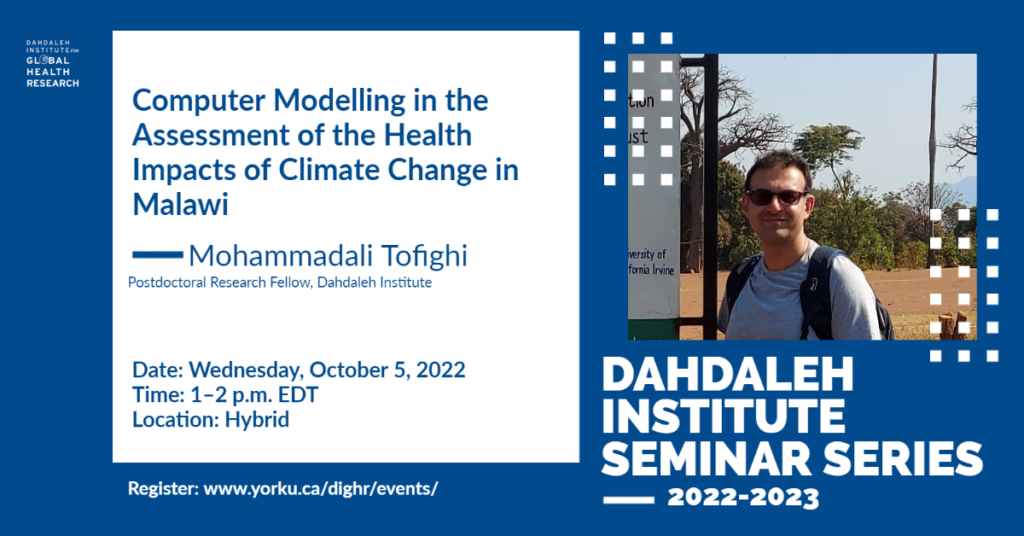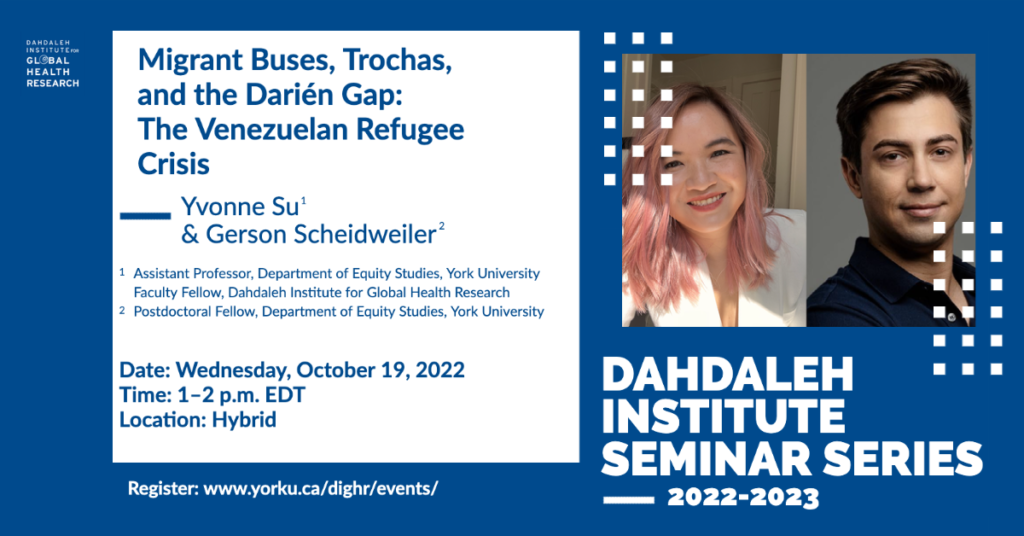
The Dahdaleh Institute continues its Global Health Research Seminar Series for the 2022-23 academic year with two events in October.
All talks will be delivered in hybrid format. Everyone is welcome. Attendees will join global health leaders, researchers, practitioners and students and during the series, they will have an opportunity to learn about the important collaborative and transdisciplinary research happening at the Dahdaleh Institute (in the thematic research areas of Planetary Health, Global Health & Humanitarianism, and Global Health Foresighting).
The full schedule of events is available at https://www.yorku.ca/dighr/events/.
Wednesday, Oct. 5, 1 p.m. EDT
Computer Modelling in the Assessment of the Health Impacts of Climate Change in Malawi, with Mohammadali Tofighi
In this seminar, Mohammadali Tofighi, a postdoctoral research Fellow at York University, will introduce an agent-based computer model for studying the health impacts of climate changes in the Lake Chilwa Basin. He will present an overview of the model's features and capabilities and discuss the challenges in developing and verifying the model and the road map that could be used to address these challenges.

Malawi is a land-locked country in the south of Africa. Malawi, and particularly the Chilwa Basin in the south of Malawi, has been highly affected by global climate change over the past few decades. The region has seen a range of devastating climate shocks, and their frequency is increasing. The most prominent shocks are irregular rainfall, drought, prolonged dry periods, and high winds. The changing climate has significant negative impacts on the economy and human health, including population displacement, disruptions in the delivery of healthcare services, increasing prevalence of infectious diseases, and both acute and chronic malnutrition.
The Dahdaleh Institute's complex adaptive modelling project aims to understand and shed light on the relationship between climate change and health impacts (infectious diseases: malaria, cholera, schistosomiasis, and acute diarrheal disease) and food security in the Lake Chilwa Basin.
Computer simulation models are increasingly being proposed as efficient tools for predicting variations in climate indicators. Recently, they have been used to study the variety of impacts of climate change. They can provide a safe environment for researchers, decision-makers, policymakers, and other stakeholders to examine different scenarios of climate change and to monitor the impacts and evaluate solutions, prevention methods, and adaptation interventions.
Tofighi holds a PhD in civil engineering in water resources management from Sharif University of Technology, Iran. He has worked as an adjunct assistant professor at the Sharif University of Technology and assistant professor at the Ale-Taha Institute of Higher Education, Iran. He has has expertise in water resources management, particularly water-related disaster management and modelling. He has participated in numerous multidisciplinary projects in flood modelling, disaster management, health care modelling, and risk analysis. He is interested in integrating simulation approaches such as agent-based and discrete events modelling, system dynamics, and machine learning methods for a better understanding of the behaviour of the systems.
Read more and register to attend.
Wednesday, Oct. 19, 1 p.m. EDT
Migrant Buses, Trochas, and the Darién Gap: The Venezuelan Refugee Crisis, with Yvonne Su and Gerson Scheidweiler

Since 2014, 6.8 million Venezuelans have fled the country due to economic, political, and social collapse, making this the world's second-largest external displacement crisis. Venezuelans are often forced to take dangerous routes –through trochas (informal trails guarded by paramilitary or gangs) and the Darién Gap (a deadly trek through Panama's jungle) – to reach host countries. When they are received, they face other challenges, especially accessing health care and employment, as well as suffering violence and discrimination. Yet, despite these unprecedented numbers and the risks displaced Venezuelans have to take, international funding for the crisis is severely lacking, and now Venezuelan refugees are being weaponized in the United States by Republicans who are bussing refugees across state lines under false pretences.
Yvonne Su and Gerson Scheidweiler will provide an overview of the Venezuelan refugee crisis and discuss the experiences of LGBT Venezuelan refugees in Brazil, particularly those in Pacaraima, Boa Vista, and Manaus.
Su is faculty Fellow of the Dahdaleh Institute and an assistant professor in the Department of Equity Studies at York University. She is an expert on forced migration, queer migration, climate refugees, and post-disaster recovery. She currently holds three SSHRC grants that examine the Venezuelan refugee crisis and compare local, national, and international responses to LGBT Venezuelan refugees in Colombia and Brazil.
Scheidweiler is a postdoctoral Fellow in the Department of Equity Studies at York University. He is an expert on gender, communication policies, human rights, and sexual health. His postdoctoral research explores the extent to which local, national, and international responses to receive and integrate Venezuelan refugees in Brazil have taken into account the sexual health of vulnerable populations (e.g., women and LGBTQI+ migrants).
Read more and register to attend.
